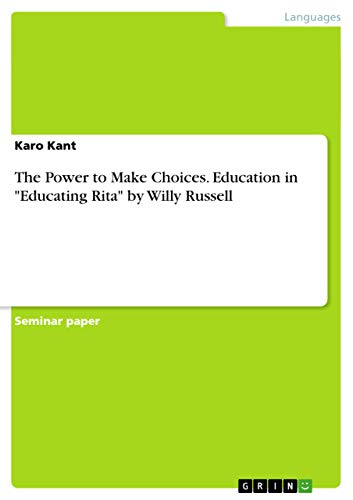Articoli correlati a The Power to Make Choices. Education in "Educating...

Le informazioni nella sezione "Riassunto" possono far riferimento a edizioni diverse di questo titolo.
- EditoreGRIN Verlag
- Data di pubblicazione2012
- ISBN 10 365615838X
- ISBN 13 9783656158387
- RilegaturaCopertina flessibile
- Numero edizione2
- Numero di pagine28
Compra nuovo
Scopri di più su questo articolo
Spese di spedizione:
EUR 23,00
Da: Germania a: U.S.A.
I migliori risultati di ricerca su AbeBooks
The Power to Make Choices. Education in "Educating Rita" by Willy Russell
Descrizione libro Taschenbuch. Condizione: Neu. This item is printed on demand - it takes 3-4 days longer - Neuware -Seminar paper from the year 2011 in the subject Literature - Basics, grade: 3,0, University of Kassel, course: Literaturwissenschaften - Education and Drama, language: English, abstract: Surrounded by traditions and habits of mind and action, working-class people have never received the chance to realize their potential. The working-class is defined by the relation of the status to manual occupations and limits economic standing as well as cultural ties and shared views (Roberts 3-4). The people's life, therefore, is prefabricated and follows strict traditions and habits. When Roberts says that 'working-class women had learned when young that their place was in the home' and that 'it was accepted by all that the ultimate resposibility for the home was theirs,' (Roberts 125) it becomes obvious that, for example, the women's task is restricted to the kitchen work, the household, and to raising the children. Women know from their childhood that to fulfill these tasks is their destiny and because of missing possibilities and the argument of traditional habits, hardly lots of women and men are trying to escape from these circumstances. Traditions and conventions in this context can also be seen as external influences that restrains individuality. Being a member of the working-class means contribution and passing on a tradition.Furthermore, working-class members feel a certain kind of repletion according to material needs which keeps them from changing the status quo. Status quo should be defined as the situation as it is now, or as it was before (Oxford 1500). Being different from somebody else, i. e. in this case from the community, is not accepted. A person always has to be a member of the group and act like one, whereas individuality is deprecated by the others (Kugler-Euerle 92). Since education is seen as useless and in contrast to the conventions, educated people distinguish themselves from the community as a whole.The following will be focused on the term Education and the implication of escaping from the boundaries of working-class members to achieve independence and individuality. The convictions and the strength to put up with the strain of traditions and conventions will be exemplified through Educating Rita by Willy Russell. 28 pp. Englisch. Codice articolo 9783656158387
The Power to Make Choices. Education in "Educating Rita" by Willy Russell
Descrizione libro Taschenbuch. Condizione: Neu. Druck auf Anfrage Neuware - Printed after ordering - Seminar paper from the year 2011 in the subject Literature - Basics, grade: 3,0, University of Kassel, course: Literaturwissenschaften - Education and Drama, language: English, abstract: Surrounded by traditions and habits of mind and action, working-class people have never received the chance to realize their potential. The working-class is defined by the relation of the status to manual occupations and limits economic standing as well as cultural ties and shared views (Roberts 3-4). The people's life, therefore, is prefabricated and follows strict traditions and habits. When Roberts says that 'working-class women had learned when young that their place was in the home' and that 'it was accepted by all that the ultimate resposibility for the home was theirs,' (Roberts 125) it becomes obvious that, for example, the women's task is restricted to the kitchen work, the household, and to raising the children. Women know from their childhood that to fulfill these tasks is their destiny and because of missing possibilities and the argument of traditional habits, hardly lots of women and men are trying to escape from these circumstances. Traditions and conventions in this context can also be seen as external influences that restrains individuality. Being a member of the working-class means contribution and passing on a tradition.Furthermore, working-class members feel a certain kind of repletion according to material needs which keeps them from changing the status quo. Status quo should be defined as the situation as it is now, or as it was before (Oxford 1500). Being different from somebody else, i. e. in this case from the community, is not accepted. A person always has to be a member of the group and act like one, whereas individuality is deprecated by the others (Kugler-Euerle 92). Since education is seen as useless and in contrast to the conventions, educated people distinguish themselves from the community as a whole.The following will be focused on the term Education and the implication of escaping from the boundaries of working-class members to achieve independence and individuality. The convictions and the strength to put up with the strain of traditions and conventions will be exemplified through Educating Rita by Willy Russell. Codice articolo 9783656158387

